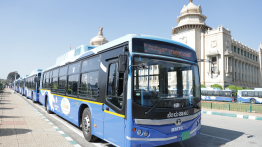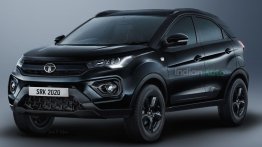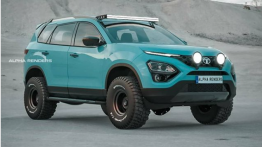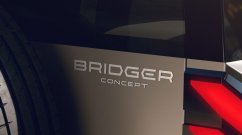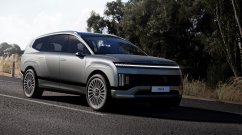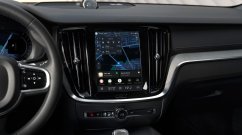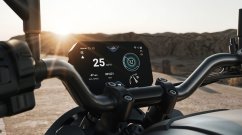Shortly after India’s new PM, Narendra Modi, took charge, the phrase ‘Ache Din Aane Wale Hain’ (which in English means ‘Good days are to come’) flooded social media and conversations. Perhaps the same phrase should have been uttered by Tata loyalists when the company showcased their future cars and engine at the Auto Expo this year. The brand wants to shed its image of a ‘taxi cab maker', and says its upcoming products deliver to the personal buyers like a Hyundai or a Maruti.
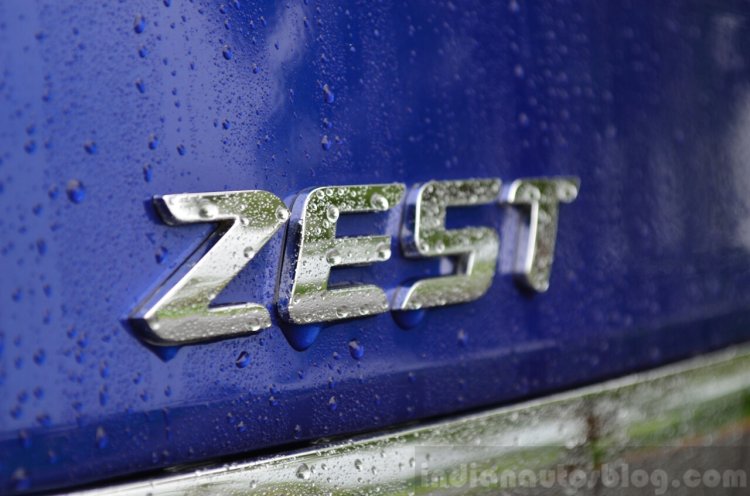
The Zest, which is the first car to launch from the ‘new’ Tata Motors, will finally go on sale next month. The compact sedan takes the fight to established rivals by offering first-in-segment features such as a turbocharged petrol engine and a diesel powered automated manual transmission. Here’s our review of the Zest diesel F-Tronic AMT.
Exteriors:
On the outside, the Zest will always be identified as a Tata thanks to its Vista-esque headlights, windows and outline. The front fascia of the Zest wears large light clusters with projector headlights and position lights, and a grille inspired by the Manza Hybrid concept which was shown at the 2012 Auto Expo.
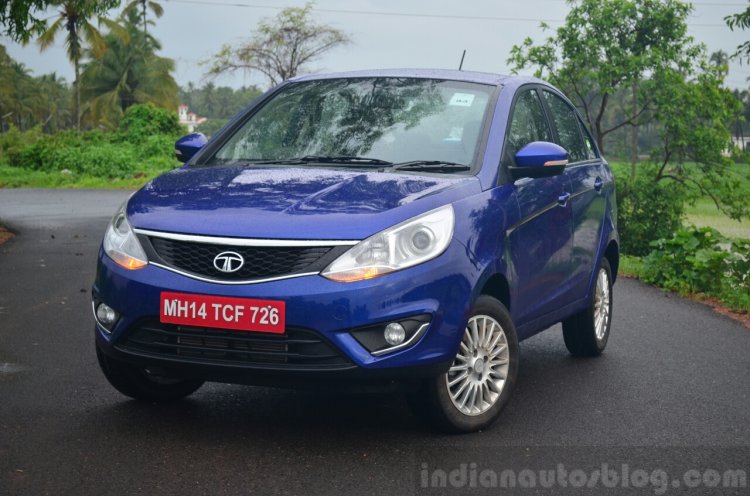
Over to the sides, the doors and windows are a-la Tata Vista. The C-Pillar and bootlid follow a similar execution as the Swift Dzire (wherein the car gets a visibly short boot section). The 18-spoke alloy wheels look pretty classy, and its visual appeal is unmissable.
The rear of the Zest ends rather abruptly to adhere to the sub-4 meter length limit. Sharply cut LED taillights, a chrome strip and badging of the car, variant and engine type (transmission in this case) should help onlookers identify it with ease.
In pure numbers, the Zest measures 3,995 x 1,706 x 1,570 (L x W x H in mm) and gets a wheelbase of 2,470 mm. The diesel AMT Zest has a ground clearance of 165 mm and a turning radius of 5.1 m. The car weighs 1,170 kg.
Interiors:
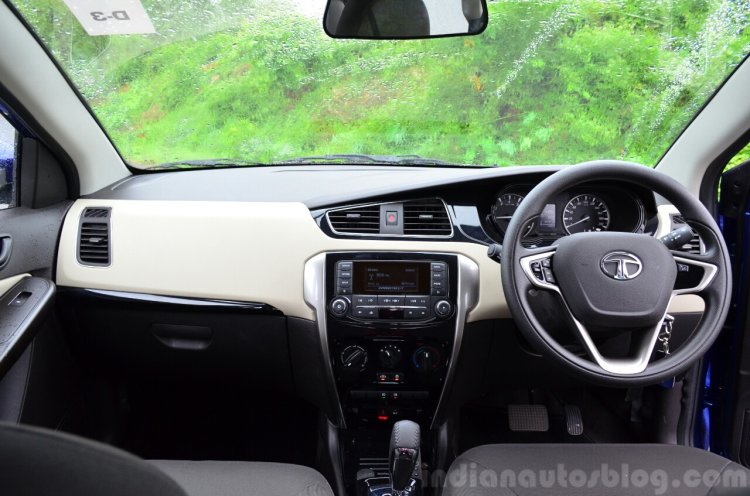
More than the exteriors, it is the cabin which is bound to get people excited. The design of the dashboard particularly is an indication that Tata wants to shed its image of a taxi car maker.
Sitting in front of the driver is a newly-designed 3-spoke steering wheel with a diameter of 360 mm (the company says this is the ideal fit) and a brand new clear-to-read instrument cluster with white illumination. The center console of this mid-level variant gets a non-touchscreen music system, below which rests controls for the AC. Towards the passenger side, the dashboard gets a beige leather-like insert which looks and feels premium.
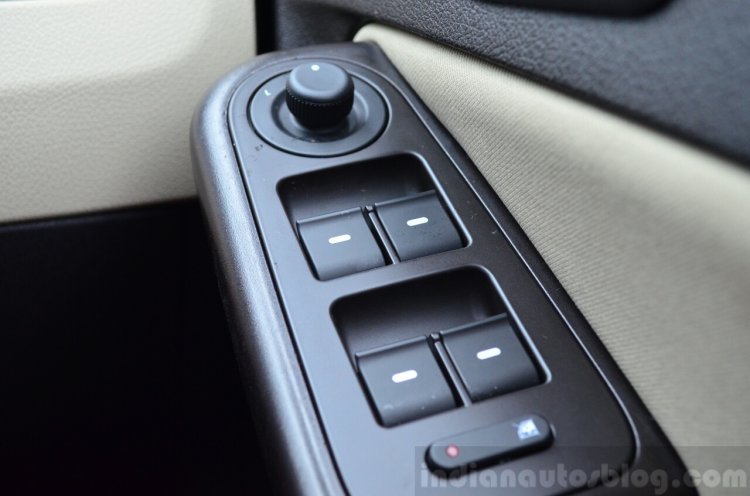
Sore points? The door handles, armrests, power window buttons don’t sync with the rest of the car on quality and design. Also, there is no bottle holder as such - either in the center console or in the doors - and even a small 500 ml bottle had to be squeezed inside the door pockets.
In terms of fit-and-finish, Tata has done a good overall job; the best for any Tata car till date, but still a notch below the Hyundai Xcent. The buttons on the dashboard, the beige fabric inserts, the control stalks for the wiper and lights feel good in quality. However, the center of the steering has sharp edges, the door handles are carried over from the Vista and feel a bit rubbery as do the door locks, and the leather-wrapped gear knob doesn’t fit very well (Note: According to a Tata official, production cars will have better fitting gear knob covers). The Zest's interior is a step in the right direction nevertheless.
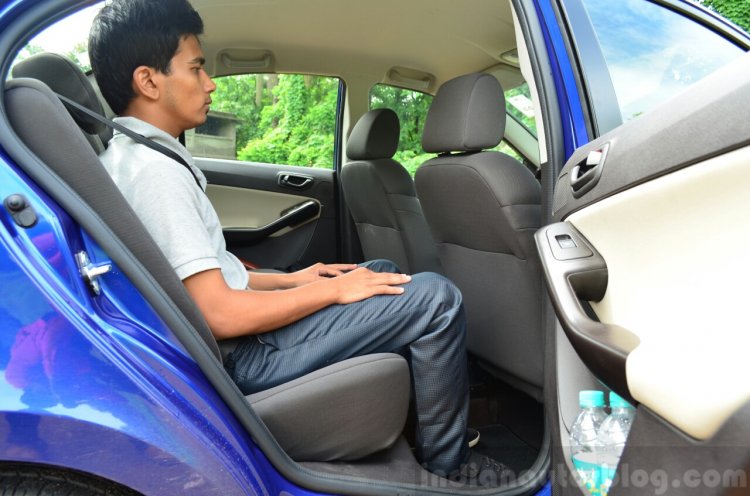
At the rear, knee room is similar to the Tata Vista which goes to say that tall adults will find it comfortable. There is adequate headroom and shoulder room for three medium-sized adults, though a center armrest is not available. The Zest offers the most supportive rear seat in its segment.
Features:
Variants and features will be revealed only during the launch, but the car you see here (XMA) is a mid-spec variant. A Tata official told Indian Autos Blog that the F-Tronic AMT system will in fact not come in the high-end trim (called XT).
While features such as projector lights, foglights, multi-spoke alloy wheels, steering integrated controls, keyless entry and Bluetooth-enabled music system are seen on this XMA variant, product planners have given basic features such as driver-seat height adjustment, auto up/down power windows and rear seat armrest a miss. The XMA also loses out on airbags, but comes equipped with ABS.
Engine and Gearbox:
Powering the Zest you see here is Fiat’s 1.3-liter Multijet diesel engine making 90 PS (88.2 bhp) and 200 Nm of torque. Though a 5-speed manual gearbox will be on offer, it is this automated manual transmission (AMT) we’re really interested in.
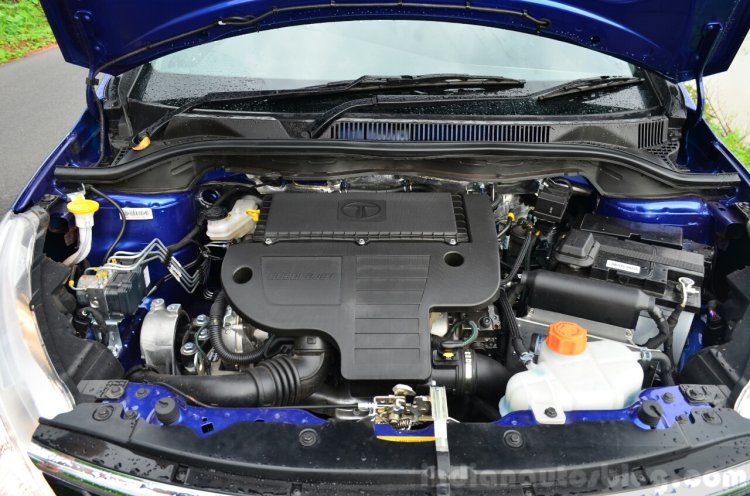
Start the engine and the Zest settles into a quiet idle. Vibrations are non-existent even when the car starts to accelerate and the overall NVH (Noise, Vibrations and Harshness) package is comparable to segment rivals. In terms of cabin insulation, the Zest feels a tad better than the Amaze.
The Magneti Marelli-made AMT system is the next highlight of the Zest. The system works very well and tries to provide smooth shifts. While shifting through lower gears (1-2, 2-3) it has a bit of jerkiness to it, but it clears out at higher gears.
The gearbox can either be left in automatic mode or in the tip-tronic mode where shifts are called by the driver by pulling/pushing the lever. When left in automatic, the Sports mode can be engaged should you want a bit more power. When in Sports mode, the gear changes occur at about 4,250 rpm, which is 600 rpm higher than the regular mode.
The AMT equipped Zest feels at home in city and highway driving conditions. It picks up pace quickly, especially in the mid-range region between 2,500-3,500 rpm. Settling at triple digit speeds is no problem for the Zest, and even beyond, there is sufficient grunt to see the speedo move past 140 km/h. Owners are bound to appreciate the engine and transmission for ease of use, power and efficiency. We can go as far as saying that the Zest diesel’s AMT feels smoother and better tuned compared to the Celerio's AMT.
To summarize, the AMT matches the 1.3 Multijet diesel engine rather well. The car will prove to be comfortable and hassle-free in the city, and equally powerful and drivable on the highway. The engine and gearbox of the Zest AMT are departments Tata have got absolutely right. Moreover the AMT module isn’t expected to cost as much as a traditional torque converter or double-clutch unit.
Ride and Handling:
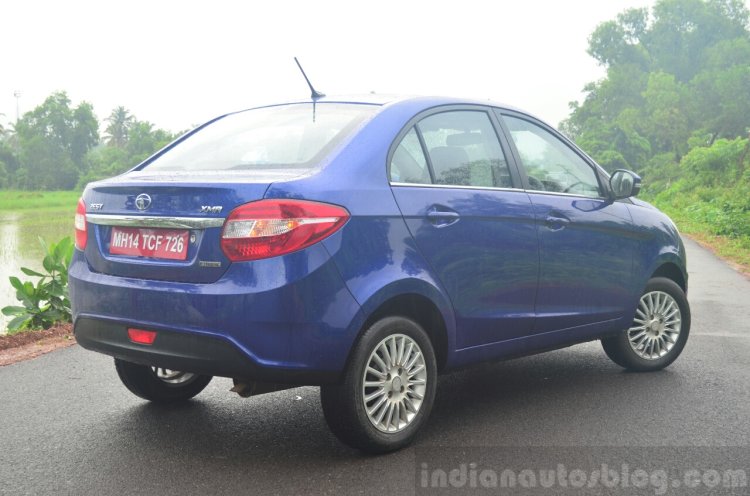
There are two key areas where the Zest impresses. The AMT system is one, and the ride and handling department is the next.
The Zest is no Fiat Linea or Ford Fiesta when it comes to handling, but it tries hard and does a rather good job. The steering has adequate feel and feedback, and its quite easy to precisely put the car through a corner at high speeds. The new EPAS (electronic power assisted steering) has a 98 percent auto return function, and it is responsive to operate irrespective of the speed.
Thanks to the new dual path front suspension, the Zest irons out a majority of road bumps and potholes to offer a plush ride. Even when the car was not loaded to full capacity, the ride was not bouncy or stiff. Ride and handling wise, the Zest offers the best compromise in its segment.
Brakes and Safety:
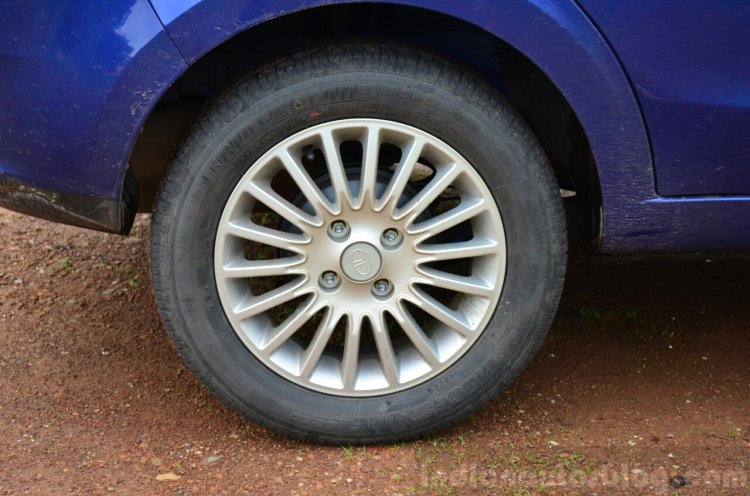
The Zest XMA comes with ABS, but no airbags, not even a driver-side unit. The brake pedal could do with a bit more feel, however, at the limit and when called upon, the brakes of the car (discs at the front and drums at the rear) work very well in bringing the Zest to a stop. The 185/60 R15 Bridgestone tires provided good levels of grip, keeping in mind that our drive took place in rainy conditions.
Fuel Efficiency:
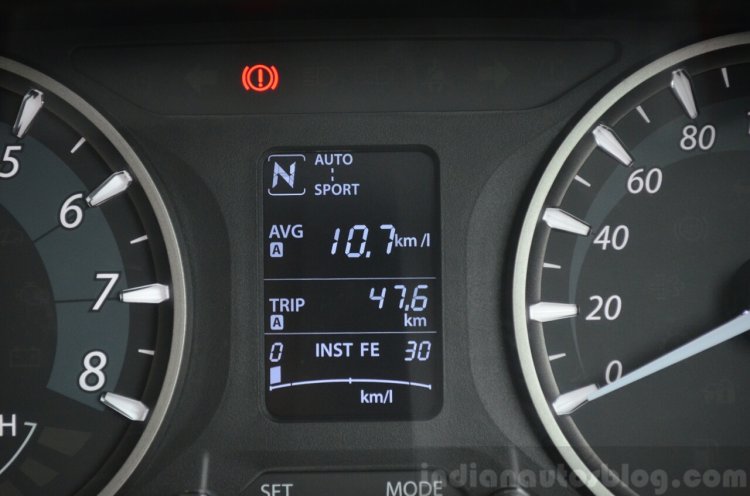
Tata will not disclose the ARAI rated efficiency of the Zest until the time of the launch. The car achieved a figure of 12 km/l under disorderly driving, and we reckon the ARAI number should be at around the 22-23 km/l mark. Given that this is an AMT, the figure for the manual transmission variant should be in the same region.
Prices:
The Zest diesel is expected to be priced between INR 6-7 lakhs, ex-Showroom, New Delhi.
Verdict:
There is nothing to not like about the Zest: The styling - inside and out - is well done, the diesel engine is a proven unit, the AMT works well, the features are decently chosen and the car strikes a fine balance between ride and handling. The only negatives about the Zest AMT are that the interior does not have the finesse of its rivals, and certain features, especially airbags, should have been included.
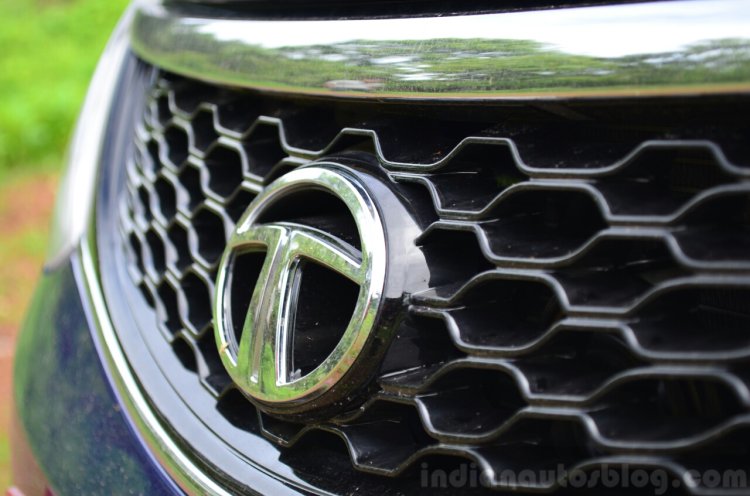
However, the negatives can be excused taking into account the larger picture: This will be the most affordable diesel-automatic car in the country, and the mechanical package is very strong.
With the Zest, Tata has proved that they can make a car which personal car buyers will wholeheartedly appreciate. Tata now needs to ensure that their aftersales service is not as patchy as before, and several steps are going to be taken in this direction according to the company. Hiring and training new employees, sprucing up dealerships and taking a digital approach to sales and aftersales are a few actions that the company believes will show immediate improvement.













































































